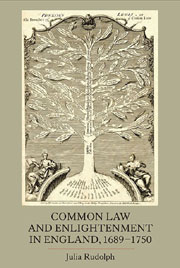Book contents
- Frontmatter
- Contents
- Acknowledgements
- Abbreviations
- 1 Against Decline
- 2 Law Books, Legal Knowledge and Enlightened Encyclopedism
- 3 Expertise and Evidentiary Practices in Science and Law
- 4 Common Law, Credit and the Growth of Commerce
- 5 Common Law Jurisprudence and the Philosophy of Natural Law
- 6 Common Law and the Morality of Markets
- 7 Legal Histories and Enlightened Historiography
- Conclusion
- Bibliography
- Index
- STUDIES IN EARLY MODERN CULTURAL, POLITICAL AND SOCIAL HISTORY
6 - Common Law and the Morality of Markets
Published online by Cambridge University Press: 05 May 2013
- Frontmatter
- Contents
- Acknowledgements
- Abbreviations
- 1 Against Decline
- 2 Law Books, Legal Knowledge and Enlightened Encyclopedism
- 3 Expertise and Evidentiary Practices in Science and Law
- 4 Common Law, Credit and the Growth of Commerce
- 5 Common Law Jurisprudence and the Philosophy of Natural Law
- 6 Common Law and the Morality of Markets
- 7 Legal Histories and Enlightened Historiography
- Conclusion
- Bibliography
- Index
- STUDIES IN EARLY MODERN CULTURAL, POLITICAL AND SOCIAL HISTORY
Summary
Among the numerous volumes on law in the Macclesfield library at Shirburn Castle – a library that, by 1750, housed tens of thousands of books and manuscripts, in multiple languages, on topics such as economics, science, mathematics, theology, music and architecture as well as law – there was a bound collection of three texts on Chancery and equity. Robert Atkyns' Enquiry into the Jurisdiction of Chancery in Causes of Equity … and The Case of the said Sir Robert Atkyns upon his Appeal, Richard Francis' Maxims of Equity, and Henry Ballow's A Treatise of Equity were gathered together in a folio volume encased in a handsome nineteenth-century binding. This was likely a rebinding of tracts originally collected by the first Earl of Macclesfield, Thomas Parker, chief justice of the Kings Bench (1710–1718) and lord chancellor (1718–1725), and his son george Parker, second Earl of Macclesfield, noted politician and astronomer. As we have seen, these tracts differed in terms of genre and style, and they presented varied perspectives on the jurisdiction of equity, and the nature of law in general. Not only do they provide further evidence of continued debate over common law and equity, and of the conjoined development of common law and natural law theory in the eighteenth century, but their juxtaposition in Macclesfield's library may also be said to indicate the vitality of jurisprudential reflection on law and morality.
- Type
- Chapter
- Information
- Common Law and Enlightenment in England, 1689-1750 , pp. 201 - 230Publisher: Boydell & BrewerPrint publication year: 2013



